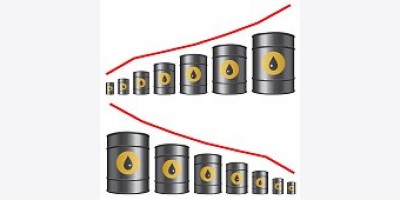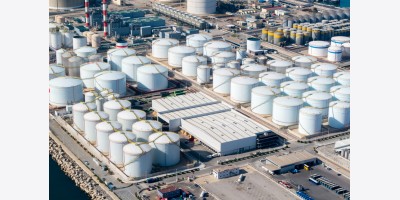
An atmospheric distillation unit, a key component for oil refineries, arrives at Vietnam's Nghi Son Port.
NGHI SON, Vietnam -- Idemitsu Kosan is part of a joint venture constructing a massive oil refinery in Vietnam. For the Japanese partner, building a facility to deal with all aspects of oil distribution, from refining to selling, is a new endeavor.
The Nghi Son Refinery is located in Vietnam's northern Thanh Hoa Province. Construction started in July 2013, with the plant halfway to full operation, planned to begin in July 2017. The project is expected to be finished by November 2016, with some eight months of testing to follow.
The refinery, with a planned processing capacity of about 200,000 barrels a day, will be a state-of-the-art facility capable of efficiently producing gasoline, light oil, and other oil-based products as well as basic chemicals such as benzene.
Currently, there is only one oil processing plant in the country. The state-owned Dung Quat refinery covers roughly 30% of the country's growing energy demands.
"Our mission is significant in terms of supporting the country's growth," said Fujio Tekeishi of Idemitsu Kosan, who is in charge of project management of the refinery.
The $9-billion project is being undertaken by Nghi Son Refinery & Petrochemical, a joint venture among Idemitsu, Mitsui Chemicals, Kuwait Petroleum International and state-run oil company PetroVietnam.

Idemitsu first thought about joining the project in 2004, but made the final decision to invest in January 2013. "Other companies would have given up," said Yasuhito Fukuda, chief business officer of NSRP. Mounting anxiety over declining oil demand in Japan is seen as one reason the company eventually decided to join the project.
In addition to developing the site, the Japanese oil distributor has been authorized to sell oil products in Vietnam.
The company is negotiating with its partners to determine the best timing for launching distribution. KPI will supply crude oil to the Nghi Son Refinery, and the processed products such as gasoline and light oil will be sold through the PetroVietnam's network of gas stations.
Previously, Idemitsu has been involved in overseas projects dealing with automotive lubricants and such upstream businesses as gas-oil field development in the U.K. and Southeast Asia and coal development in Australia. Operating businesses that cover the entire process from oil processing to distribution would provide a stable profit scheme able to avoid the pitfalls of fluctuating demand.
Vietnam and other Southeast Asian countries are particularly attractive markets because of their high growth. The region could be a new high-potential target to replace China.
Idemitsu's efforts are also motivating its Japanese rivals. "Overseas opportunities in refinement and distribution could be a big chance for new sources of revenue," said Tsutomu Sugimori, JX Nippon Oil & Energy's president.
Sugimori's company is preparing to make the final decision on construction of an oil refinery in partnership with state-run Vietnam National Petroleum Group, known as Petrolimex. It is also considering the restoration of aging oil refineries in Indonesia.
The fierce competition once seen in Japan is shifting to offshore markets.
Vietnam and other Southeast Asian countries are particularly attractive markets because of their high growth. The region could be a new high-potential target to replace China.
Idemitsu's efforts are also motivating its Japanese rivals. "Overseas opportunities in refinement and distribution could be a big chance for new sources of revenue," said Tsutomu Sugimori, JX Nippon Oil & Energy's president.
Sugimori's company is preparing to make the final decision on construction of an oil refinery in partnership with state-run Vietnam National Petroleum Group, known as Petrolimex. It is also considering the restoration of aging oil refineries in Indonesia.
The fierce competition once seen in Japan is shifting to offshore markets.
Source: Nikkei Asian Review























